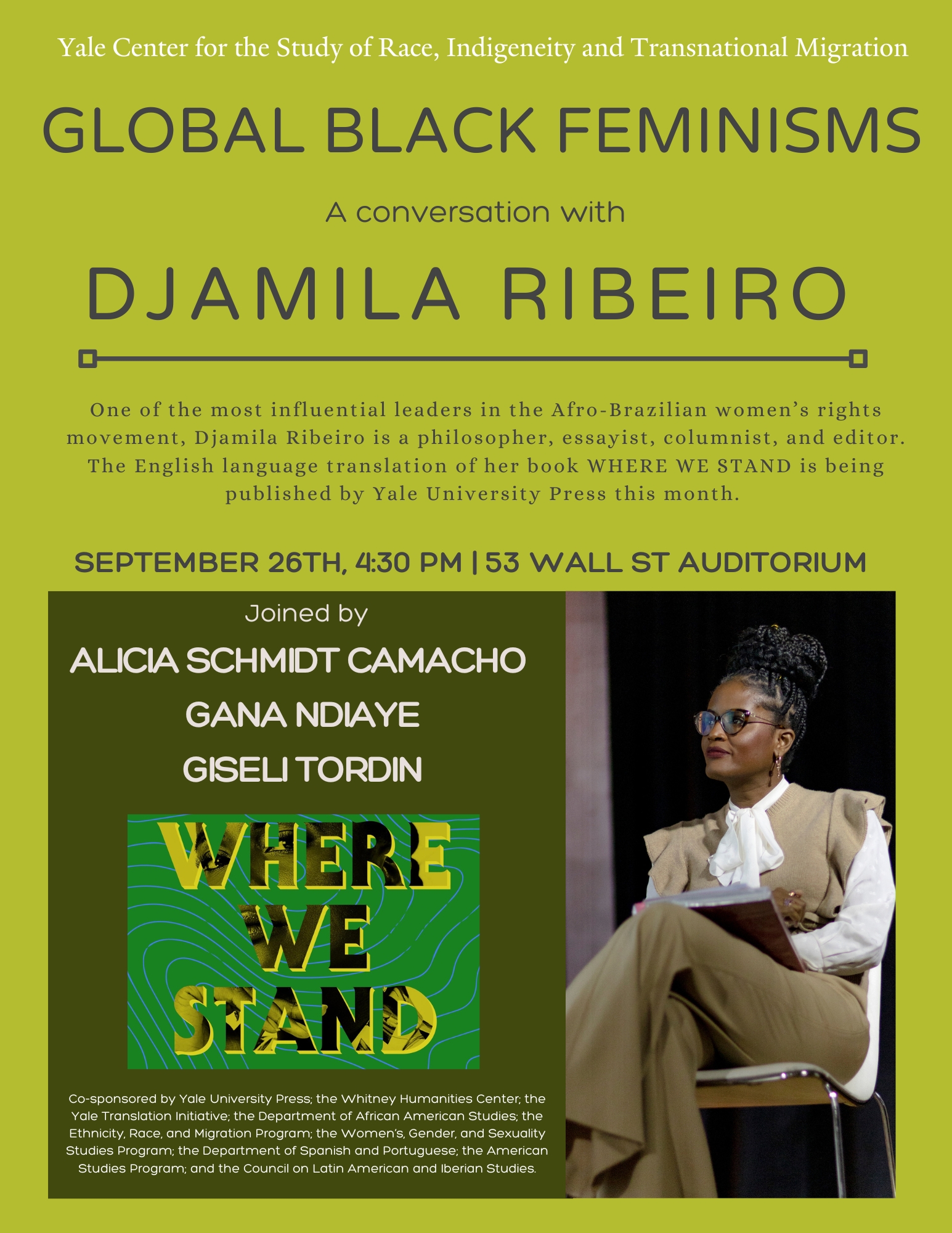 In a society shaped by the legacies of enslavement, white supremacy, and sexism, who has the right to a voice? In her book, Where We Stand, Djamila Ribeiro offers a compelling intervention into contemporary discussions of power and identity: the concept of “speaking place.” A crucial component of conversations on race and gender in Brazil, speaking place is the idea that everyone has a social position in the world and that what we are able to say, and how it is received by others, depends on it. Ribeiro traces the history of Black feminist thought through several centuries, examining the ways that Black women have been silenced, ignored, and punished for speaking.
In a society shaped by the legacies of enslavement, white supremacy, and sexism, who has the right to a voice? In her book, Where We Stand, Djamila Ribeiro offers a compelling intervention into contemporary discussions of power and identity: the concept of “speaking place.” A crucial component of conversations on race and gender in Brazil, speaking place is the idea that everyone has a social position in the world and that what we are able to say, and how it is received by others, depends on it. Ribeiro traces the history of Black feminist thought through several centuries, examining the ways that Black women have been silenced, ignored, and punished for speaking.
Building on feminist standpoint theory, and in conversation with the works of Sojourner Truth, Bell Hooks, Audre Lorde, and others, Ribeiro invites all of us to recognize where we stand, to imagine geographies different from those we’ve inherited, and to speak a more humane world into being. In this event, "Global Black Feminisms," Ribeiro will be in conversation with scholars Alicia Schmidt Camacho, Gana Ndiaye, and Giseli Tordin.
Djamila Ribeiro
Djamila Ribeiro is a philosopher, essayist, editor, and one of the most influential leaders in the Afro-Brazilian women’s rights movement. She has been a lecturer in political philosophy at UNIFESP since 2020 and was a visiting professor at the Universidade Católica de São Paulo in 2020. Ribeiro is a collaborating editor of weekly magazine CartaCapital, as well as a columnist for CartaCapital, Folha de S. Paulo, and Marie Claire. In May 2016, she was appointed São Paulo’s vice-secretary for Human Rights and Citizenship Affairs. She prefaced the Brazilian Portuguese edition of Women, Race and Class by Angela Davis, with whom she has collaborated on a number of occasions. She is the author of several books, including Lugar de Fala (to appear in English as Where We Stand, 2017), which was the first in the series Plural Feminisms, a collection within Sueli Carneiro’s editorial seal that publishes black writers’ works at affordable prices. Her second book, Quem tem medo do feminismo negro? (Who's Afraid of Black Feminism?, 2018), is a collection of essays on topics such as social mobilization, racial quota policies, and the origins of black feminism in Brazil and America. She is also the author of Pequeno manual antirracista (A Short Antiracist Handbook, 2019); Nós, Madalenas (We Magdalenes, 2019), a project that brings together more than 100 photographs and essays by women; and Cartas para minha avó (Letters to my Grandmother, 2021). In 2019, she was awarded the Prince Claus Prize from the Netherlands; in the same year, she was named one of the 100 most influential women in the world by the BBC. In 2021, she was the first Brazilian person in history to receive the Black Entertainment Television International Global Good Award.
Alicia Schmidt Camacho
Alicia Schmidt Camacho is Professor Ethnicity, Race, and Migration, and holds affiliations with the Center for the Study of Race, Indigeneity, and Transnational Migration, the Council of Latin American and Iberian Studies, and the American Studies and Women’s, Gender, and Sexuality Programs. Her scholarship examines migration, social movements, and cultural politics in North America. Read more about Camacho here.
Gana Ndiaye
Gana Ndiaye is Assistant Professor of Ethnicity, Race, and Migration.His interdisciplinary research and teaching interests include migration, race and ethnicity, informal economies, Muslim market ethics, and the ʿAjamī (modified Arabic script) literary traditions of Muslim Africa. Read more about Ndiaye here.
Giseli Tordin
Giseli Tordin is currently a Senior Lector I of Spanish and Portuguese, coordinator of the Portuguese language program, and director of the Portuguese placement exam. Her scholarly interests include Latin American studies, psychoanalysis, literature, and film, decolonial feminism, use of technology in Humanities, women filmmakers, Spanish and Portuguese as an additional language, didactic sequences, and contemporary literacies.Her recent research focuses on the writing of women while they were hospitalized in asylums. An example is her chapter on “Ilhas de lucidez na obra de Stela do Patrocínio e Maura Lopes Cançado” for Ilhas de vozes em reencontros compartilhados, 2021 (ed. Susana Antunes). Her other researches include the intersectionality of violence in Latin American literature, the interplay between ethnicity and aging in the Latin American Women’s Filmmaking, and the new perspectives of Spanish and Portuguese languages teaching. Read more about Tordin here.
Co-sponsors
- Yale University Press
- Whitney Humanities Center
- Yale Translation Initiative
- Department of African American Studies
- Ethnicity, Race, and Migration
- Women's, Gender, and Sexuality Studies
- Department of Spanish and Portuguese
- American Studies Program
- Council on Latin American and Iberian Studies.
